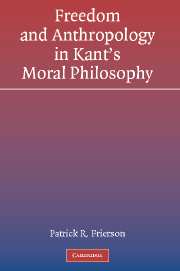Book contents
- Frontmatter
- Dedication
- Contents
- Preface
- Introduction: A Problem with Kant’s Moral Anthropology
- I The Problem
- 1 The Asymmetry in Kant’s Conception of Freedom
- 2 Anthropology as an Empirical Science
- 3 The Moral Importance of Kant’s “Pragmatic” Anthropology
- 4 Moral Anthropology in Contemporary Neokantian Ethics
- II The Solution
- 5 Transcendental Idealism, Radical Evil, and Moral Anthropology
- 6 Moral Influence on Others
- Epilogue: Incorporating Moral Anthropology and Defending Kantian Moral Philosophy
- Notes
- References
- Index of Kant’s Works
- Name Index
- Subject Index
1 - The Asymmetry in Kant's Conception of Freedom
Published online by Cambridge University Press: 28 July 2009
- Frontmatter
- Dedication
- Contents
- Preface
- Introduction: A Problem with Kant’s Moral Anthropology
- I The Problem
- 1 The Asymmetry in Kant’s Conception of Freedom
- 2 Anthropology as an Empirical Science
- 3 The Moral Importance of Kant’s “Pragmatic” Anthropology
- 4 Moral Anthropology in Contemporary Neokantian Ethics
- II The Solution
- 5 Transcendental Idealism, Radical Evil, and Moral Anthropology
- 6 Moral Influence on Others
- Epilogue: Incorporating Moral Anthropology and Defending Kantian Moral Philosophy
- Notes
- References
- Index of Kant’s Works
- Name Index
- Subject Index
Summary
In the Introduction, I raised a problem with Kant's moral anthropology. For this problem to make any contact with Kant's philosophy, Kant's theory of freedom must preclude the influence of empirical causes on moral choice. In this chapter, I argue that Kant does articulate just such a conception of human agency. In section 1, I briefly sketch Kant's mature argument for freedom and draw attention to the role of moral responsibility in this argument. In section 2, I argue that whatever one believes about the relationship between freedom and nature, or noumena and phenomena, or practical and theoretical perspectives, it is essential to recognize that for Kant, freedom is the ground of nature and not vice versa. Although Kant cannot explain how freedom grounds nature, he can say something about what this relation means, and why one must assume it. To avoid entering into recent debates about whether Kant offers primarily a two-object or a two-perspective account of the self, I defend the asymmetry of the relation between nature and freedom on both the two-object and two-perspective interpretations of the relation. In section 3, in order to clarify this asymmetry, I point out how the priority of the practical precludes any traditional determinist account of freedom. Finally, in the last section I touch on the nature of our knowledge or lack thereof of the free self.
- Type
- Chapter
- Information
- Freedom and Anthropology in Kant's Moral Philosophy , pp. 13 - 30Publisher: Cambridge University PressPrint publication year: 2003



